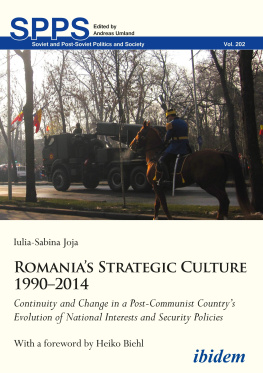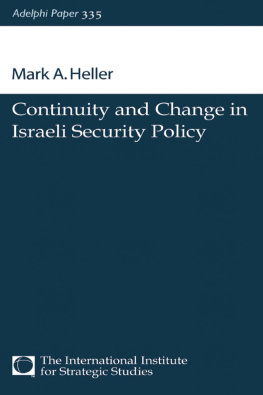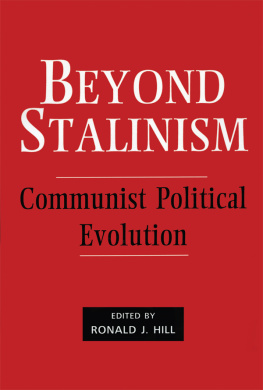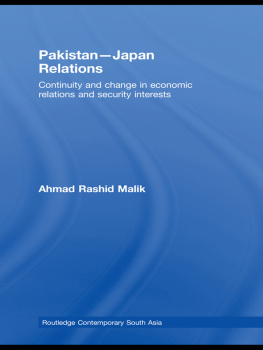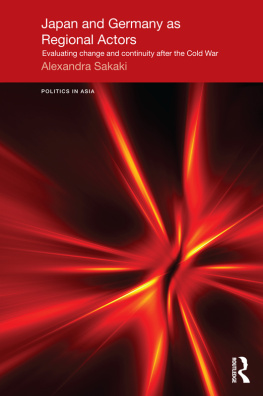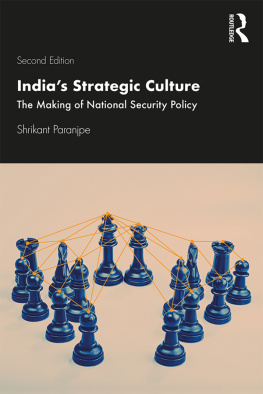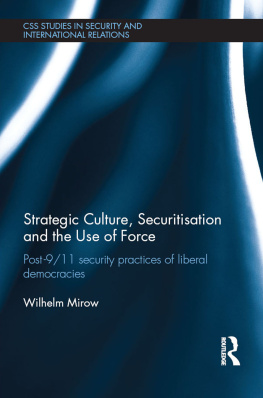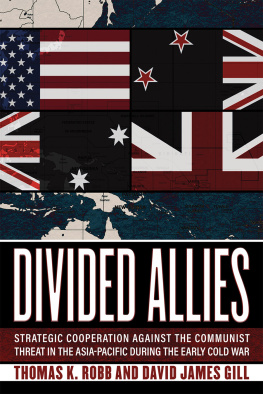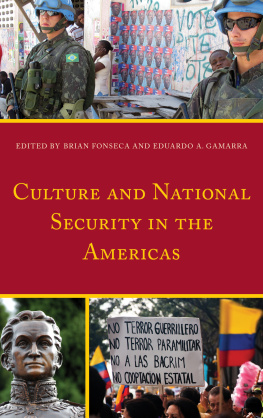Foreword
For some years now, the concept of strategic culture has been undergoing a renaissance. In political parlance, the phrase and idea have become increasingly common. Fifteen years ago, the first European Security Strategy asserted:
We need to develop a strategic culture that fosters early, rapid, and when necessary, robust intervention.
Recently Emmanuel Macron has called for a European strategic culture, and Angela Merkel, when asked about the integration of Europes defense policies, answered: ...we need to develop a common strategic culture.
In academia its presence is also conspicuous. Using Johnstons model for periodization we might now identify a fourth generation of study on the subject. There have been a number of publications (mostly focused on European powers) in the last two decades. The current generation of literature is different in two particularly interesting ways. First, most analyses investigate strategic cultures of allied nations and partners, rarely those of opponents or enemies. While Jack Snyder's pioneering study examined the Soviet nuclear strategy, most of the current research observes similarities and differences between Western nations. This leads us to the second common feature: studies of strategic culture tend to look at more than one nation at a time. The advantage seems obvious: some traits of strategic cultures can only be observed through contrast.
Does this render single-country studies useless? Quite the opposite, as Iulia Jojas superb book on Romanian strategic culture shows. Her in-depth study challenges some taken-for-granted assumptions in current thought. While most of the literature emphasizes the characteristics of stability and continuity, the ambition of her study is to offer a conceptual explanation for how change takes place in strategic culture. Romanias transition from a communist state to a reliable partner in EU and NATO makes it a perfect candidate for such a study. Located in South-East Europe, Romania was for centuries at the crossroads of the Austrian, Russian, and Ottoman empires and similarly tied to the Black Sea region, the Balkans, the Mediterranean and Central Europe. After being a partner of the Entente in the World War I, nationalist ideas led to territorial acquisitions and the foundation of Greater Romania in the interwar period. By the end of the 1930s, Romania was a fascist dictatorship and fought alongside Nazi Germany and the Axis Powers in World War II. Although the country was a communist autocracy and member state of the Warsaw Pact, Romania maintained relatively autonomous relations with the West after this. Following the violent revolution of 1989-1990, Romania has become a democracy with a strong orientation towards Western Europe and the Transatlantic Alliance. A member of NATO since 2004 and part of the European Union since 2007, Romania is today a determinedly Western country. This double integration is strong asset for the country, particularly in the face of new uncertainties caused by the Russian occupation of the Crimea and the war in Ukraine.
By exploring Romanias turbulent history, Iulia Joja convincingly shows that core elements of Romanian strategic culture remain fairly stable, even through regime changes, whereas policy areas like foreign, defense or security tend to adapt to the political needs and challenges of the specific historical moment.
With this compelling contribution to the literature, Iulia Joja has broadened and deepened our understanding of the strategic culture of smaller countries. Like most European nations, Romaniamust constantly strike a balance between ambition and the availability of resources. The solution: participation in Western organizations. Membership of NATO and the European Union, therefore, was, and still is, seen as key to Romanias security. Like many other European nations, Romanias security and defense policies are mostly multinational in nature, enacted through and for alliances and organizations. Romania seems less concerned about the immediate effects of its engagement, such as military deployments in Iraq or Afghanistan, and more interested in influencing multinational policy in order to generate a mutual sense of obligation and solidarity.
The main objection to the concept of strategic culture is its tendency to emphasize stability and continuity, and the fact that it does not try to explain or predict change. Using her layers model, Iulia Joja provides a tool with which to analyze change in a meaningful way. Her models distinction between a core of firm, unchanging norms, values and orientations and several more adjustable layers of policies, instruments and resources will certainly influence future debate. The more this model is applied, the more its potential will be demonstrated.
Iulia Jojas study brings together the perfect balance of historical knowledge, conceptual insights and relevant political findings. The book is not only of interest for scholars of strategic cultures, security studies or Romanian history. Through its clear structure, convincing arguments and readable style it is accessible and useful to the spectrum of political and military practitioners, especially those assigned to international organizations. Jojas background has well equipped her to address both audiences. She studied Political Science and International Relations in Berlin and Bucharest and holds a Master of Arts in International Conflict Studies from Kings College War Studies Department in London. In addition to her academic credentials Iulia Joja has held positions with the UN, the Romanian Ministry of Foreign Affairs, the European Parliament, NATO Allied Command Transformation and was also an adviser on security and defense at the Romanian Presidency. Currently, she is a Hanns Seidel post-doc fellow at the Bundeswehr Center for Military History and Social Sciences in Potsdam. By combining this broad range of academic experience with her unique perspective on policy making, Joja provides new insights and interpretations to the academic conversation.
I am sure that Iulia Jojas book will achieve the academic attention and readership it deserves.
Heiko Biehl
Berlin, November 30, 2018
List of Abbreviations
CARCentral African Republic
CEECCentral and Eastern Europe
CSDPCommon Security and Defense Policy
EFSPEuropeanization of foreign and security policy
ESDPEuropean Security and Defense Policy
EUEuropean Union
GDPGross Domestic Product
IRESRomanian Institute for Evaluation and Strategy
NATONorth Atlantic Treaty Organization
NDSNational Defense Strategy
NSFNational Salvation Front
NSSNational Security Strategy
SCNDSupreme Council of National Defense
TEUTreaty of the European Union
UNUnited Nations
USUnited States (of America)
WEUWestern European Union

